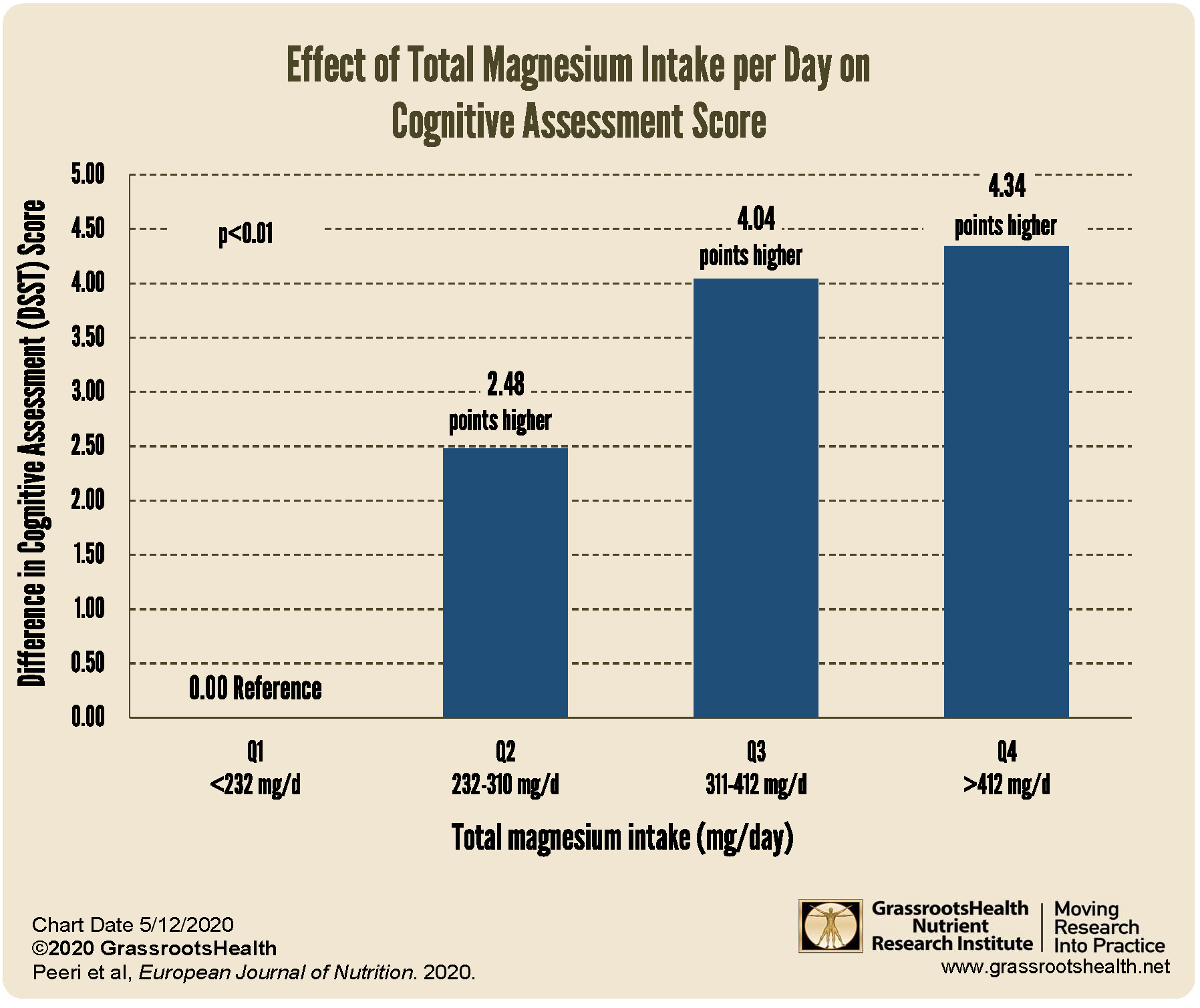Published on May 13, 2020
Several nutrients are known to have a significant effect on cognitive health. Studies have shown higher vitamin D levels to be related to a decreased risk of dementia and Alzheimer’s Disease, and have demonstrated protective benefits from B vitamins and omega-3 fatty acids. A new study provides evidence of increased magnesium intake, along with vitamin D levels, having beneficial effects for the aging brain. We continue to see with the data we are accruing from our participants that magnesium definitely interacts with vitamin D, and shows up in many ways, including in helping maintain proper heart rhythms.
Magnesium Intake and Vitamin D Status Linked to Cognitive Function
 Using data from the National Health and Nutrition Survey (NHANES) 2011-2014, Peeri et al. studied the interaction between magnesium and vitamin D by assessing magnesium intake and serum vitamin D levels, and their association with cognitive decline in older adults. The analysis included 2466 participants ages 60 and older. The Digit Symbol Substitution Test (DSST), which measures cognitive performance by assessing executive function and processing speed, was used to identify and define the level of any existing cognitive impairment.
Using data from the National Health and Nutrition Survey (NHANES) 2011-2014, Peeri et al. studied the interaction between magnesium and vitamin D by assessing magnesium intake and serum vitamin D levels, and their association with cognitive decline in older adults. The analysis included 2466 participants ages 60 and older. The Digit Symbol Substitution Test (DSST), which measures cognitive performance by assessing executive function and processing speed, was used to identify and define the level of any existing cognitive impairment.
While the relationships were not linear, the authors found a significant association between magnesium intake and reduced odds of cognitive impairment for the third and highest quartiles of magnesium intake compared to the lowest (p trend <0.01), and similarly for the third and highest quartiles of vitamin D serum levels compared to the lowest (p trend=0.05). Compared to participants with the lowest magnesium intake amounts, participants with the highest intakes scored an average of 4.43 points higher on the DSST, as shown in the chart below. Results were adjusted for potential confounding factors of age, sex, race/ethnicity, education, season of exam, BMI, smoking status, physical activity, alcohol use, diabetes status, history of cancer, heart attack, and stroke, dietary intakes of total energy and total calcium intake, with an additional adjustment for serum vitamin D and total magnesium intake.
This study supports the need for multiple nutrients to help maintain cognitive health as we age.
Are you getting enough nutrients for your brain’s health?
Test today to make sure you are getting enough of these essential brain nutrients. Measure all three nutrients mentioned above, magnesium, vitamin D, and omega-3s, with the Mg*PLUS Test Kit, and start taking steps to ensure proper levels of each – give your brain the nutrients it needs to stay healthy and sharp as you age!
Through GrassrootsHealth Nutrient Research Institute, you can also test your essential elements magnesium, copper, zinc and selenium, toxins such as lead, mercury and cadmium, as well as your omega-3 levels, inflammation levels and thyroid stimulating hormone (TSH) level. Find out your levels today! Log on to the test selection page (click the link below) to get your tests and see for yourself if your levels can be improved.
Make sure you track your results before and after, about every 6 months!
How can I track my nutrient intake and levels over time?
To help you track your supplement use and nutrient levels, GrassrootsHealth has created the Personal Health Nutrient Decision System called
For each specific supplement, you can track what days you take it, how much, and many other details. This will help you know your true supplemental intake and what patterns of use work for you to reach and maintain optimum nutrient levels. Check it out today!









